
Portland Magazine
October 17, 2022
Robert D. Kelly, UP’s 21st president, comes to the role with faith, experience, and hope for transformation.
Story by Jessica Murphy Moo
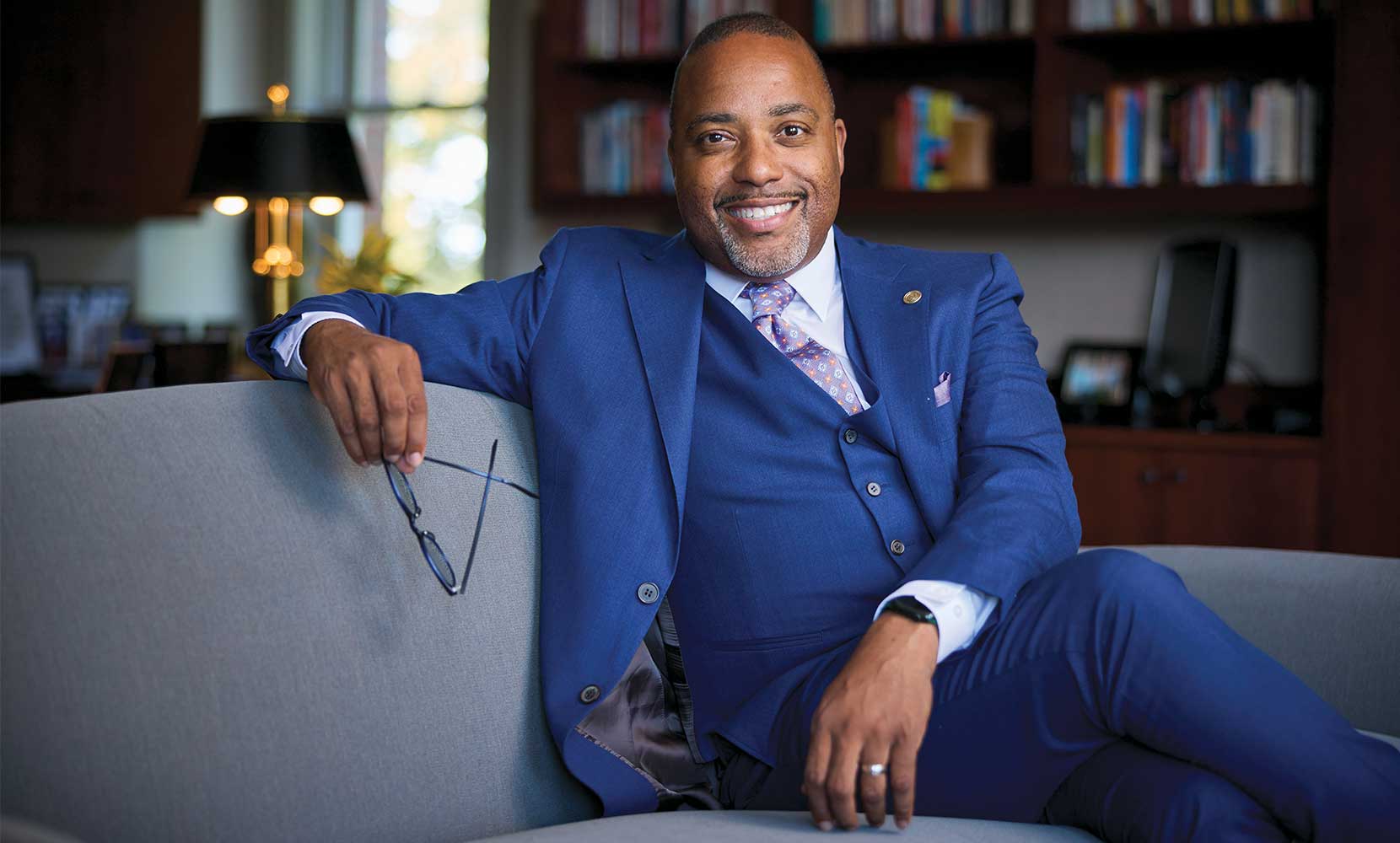
ASK ROB KELLY about a time when he found his own Catholic education to be transformative—because he firmly holds the belief that higher education should be a transformative experience for students—and he’ll tell you about a defining undergraduate experience at Loyola University Maryland, his Jesuit alma mater.
One of his political science professors brought the student newspaper to class and read an article about a charged incident that had happened on campus. A janitor had set up a “caution” sign while mopping a building’s floors, and a student (unnamed in the story) intentionally kicked it over. While clearly disrespectful, what about the incident merited discussion in a class about power and powerlessness?
Consider how gender and race might affect our reading of the story. When we learn that the student was male and the janitor was female, how does this affect how we interpret the power dynamics at play? When we learn that the student was white and the janitor was Black, how does this further change our reading of the incident?
In part, Rob Kelly remembers this class because it helped him understand that what he was studying had real-world applications. But there’s also what happened next. After the professor had finished reading the article, and before the discussion began, a student in the class raised his hand and said, “The student in that story is me.”
A tense silence filled the room. And the professor ended up dismissing class.
What Rob particularly admires is that the professor came back to the next meeting ready to return to the challenging moment. “I thought it was brave to end the conversation, and I thought it was even more brave to pick it back up,” he said. The need for open dialogue, however difficult, would become a focus of Rob’s work and scholarship. In that classroom, we can also see seedlings of Rob’s professional interest in student affairs—how does one turn a problematic moment into an opportunity for student growth?
Student growth and student belonging have since become two guideposts of his career.
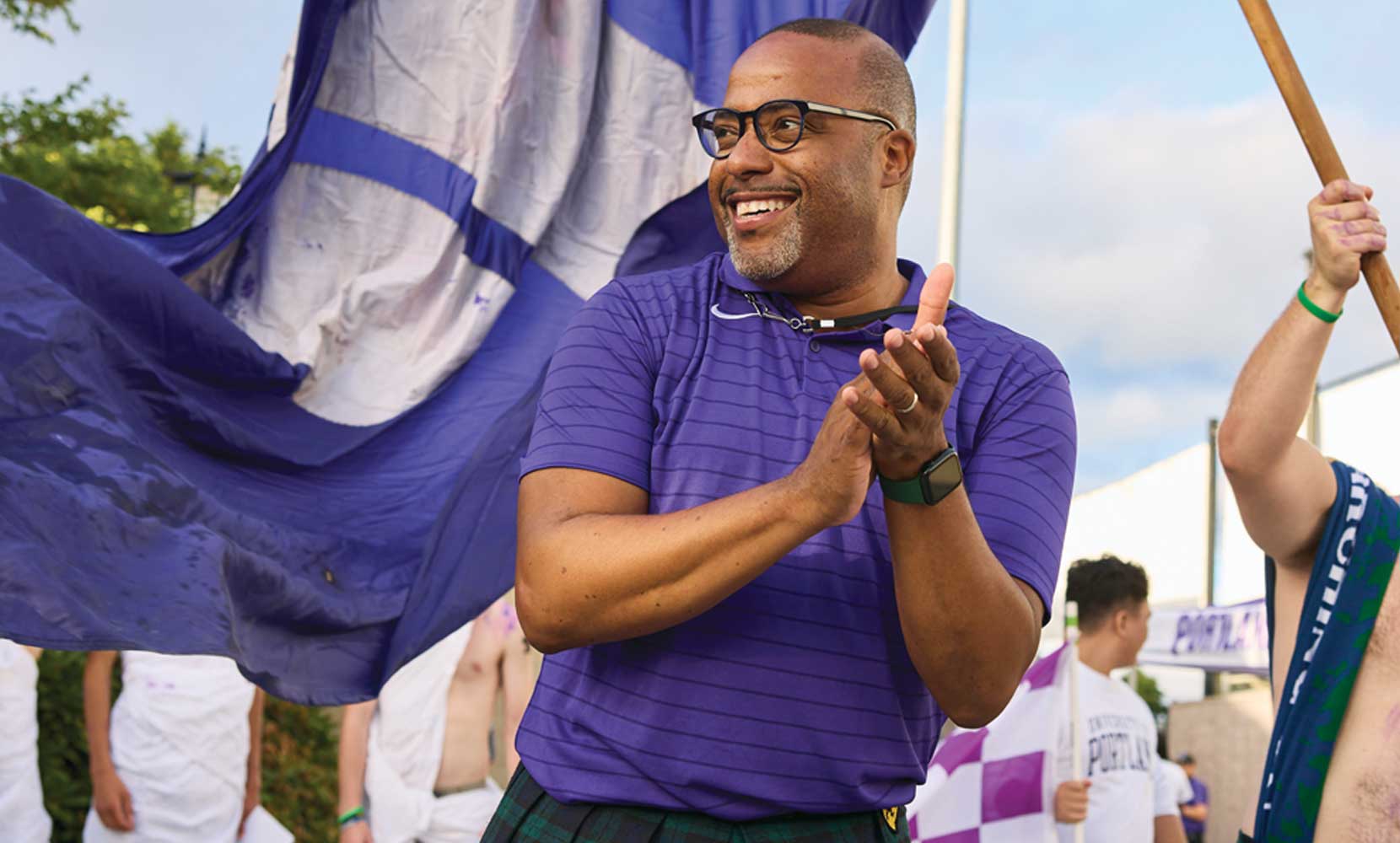
In large part, Rob has found growth and belonging in his own education through the love and support of family, teachers, and mentors.
Kelly was born and raised in New Jersey, in a loving family of four. His father worked for the United Parcel Service and was involved in labor regulations for workers. His mother was a telephone operator for Bell, later AT&T. His parents, who met in high school, believed in the strength and values of a Catholic education for their sons. In fact, as soon as his father learned about Rob’s appointment as president at University of Portland, he drove straight over to Sacred Heart to thank the principal, Sr. Frances Salemi, who taught Rob in fourth grade. (I spoke to Sr. Frances, and she, too, is proud. They posted about it on their Facebook page.)
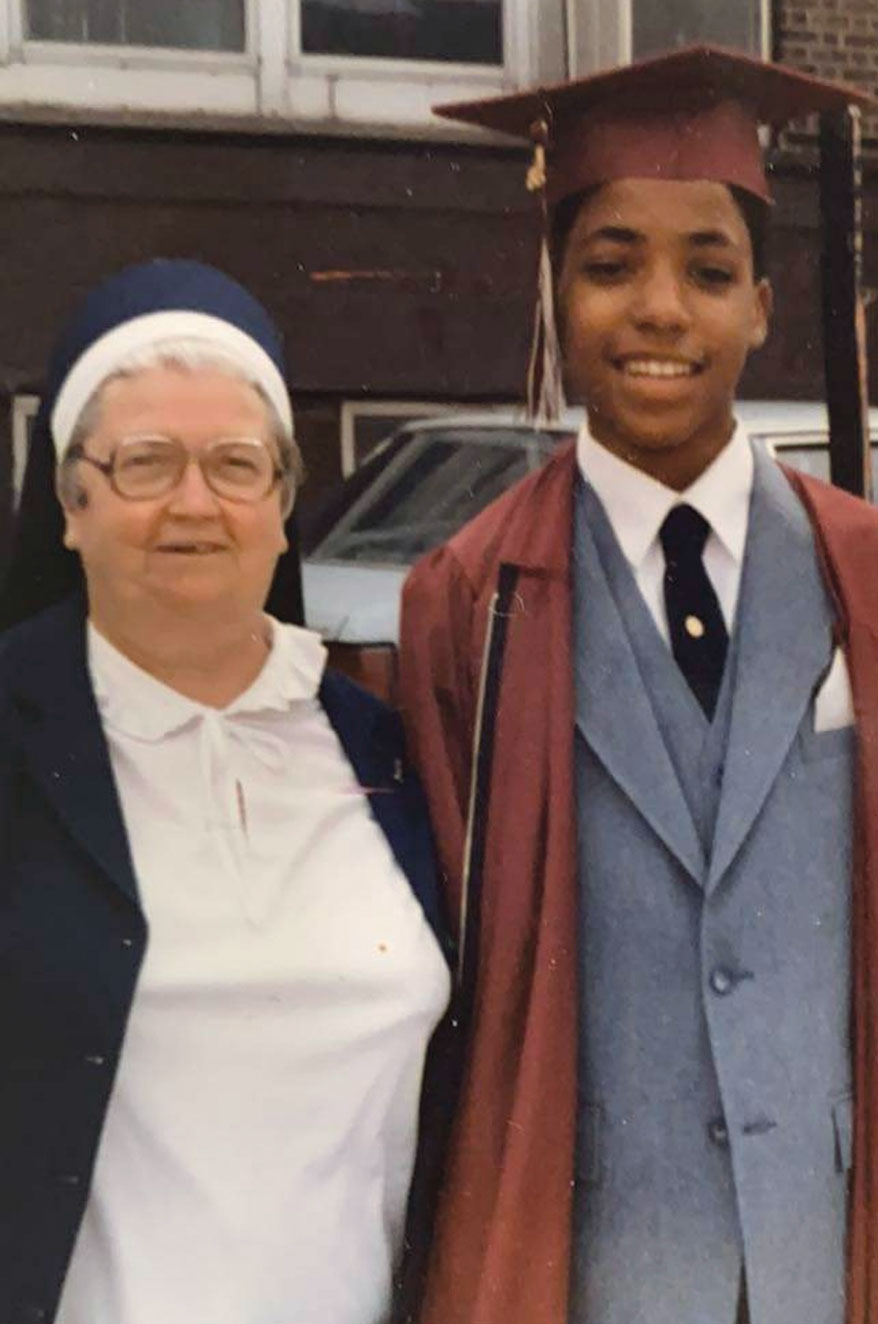
One of his former mentors at his undergraduate alma mater was Susan Donovan—now president of an independent Catholic school, Bellarmine University. She remembers that Rob was very engaged in student body leadership and that he had a maturity beyond his years. “The Rob you meet today is the Rob you met in college—poised, thoughtful, prepared, intentional, and considerate.” He created a student advisory group for the president there, a structure that is still in place 30 years on. Back then Donovan used to joke that she would probably be working for Rob someday. When he joined the school’s board of trustees, that prediction became more or less true.
He continued his education, eventually earning his PhD in education policy, planning, and administration from University of Maryland. He has held leadership positions at Loyola University Maryland, Seattle University, University of Vermont, Loyola University Chicago, Union College, and Colgate University. During this time, he became a mentor for students and young colleagues.
“Rob really is one of those people who makes you feel that you belong and you matter. He made that a reality for me,” said Matt Razek, who worked with Rob as a student at Loyola University Chicago and went on to a career in student affairs.
KC Mmeje, now the vice president of student affairs at Southern Methodist University, responded to Rob’s professional mentorship—“He lights up the darkest of spaces,” Mmeje said. “He’s an easy person to follow.” Mmeje’s personal experience resonated with Rob’s vision of what an education can mean in the life of historically underserved students. “Rob understands the pivotal role that education plays for first generation students, that there are opportunities and experiences they wouldn’t have without that education.”
Lori White, president of Depauw University, who also comes from a student affairs background, hopes UP students are ready to work with a president who wants to involve them. “He will invite students into conversations about what UP is and what UP will become,” she said.
Fr. Stephen Sundborg, SJ, the former president of Seattle University, said, “I think students will be amazed at the access they have to him. That they will be able to know who their president is.”
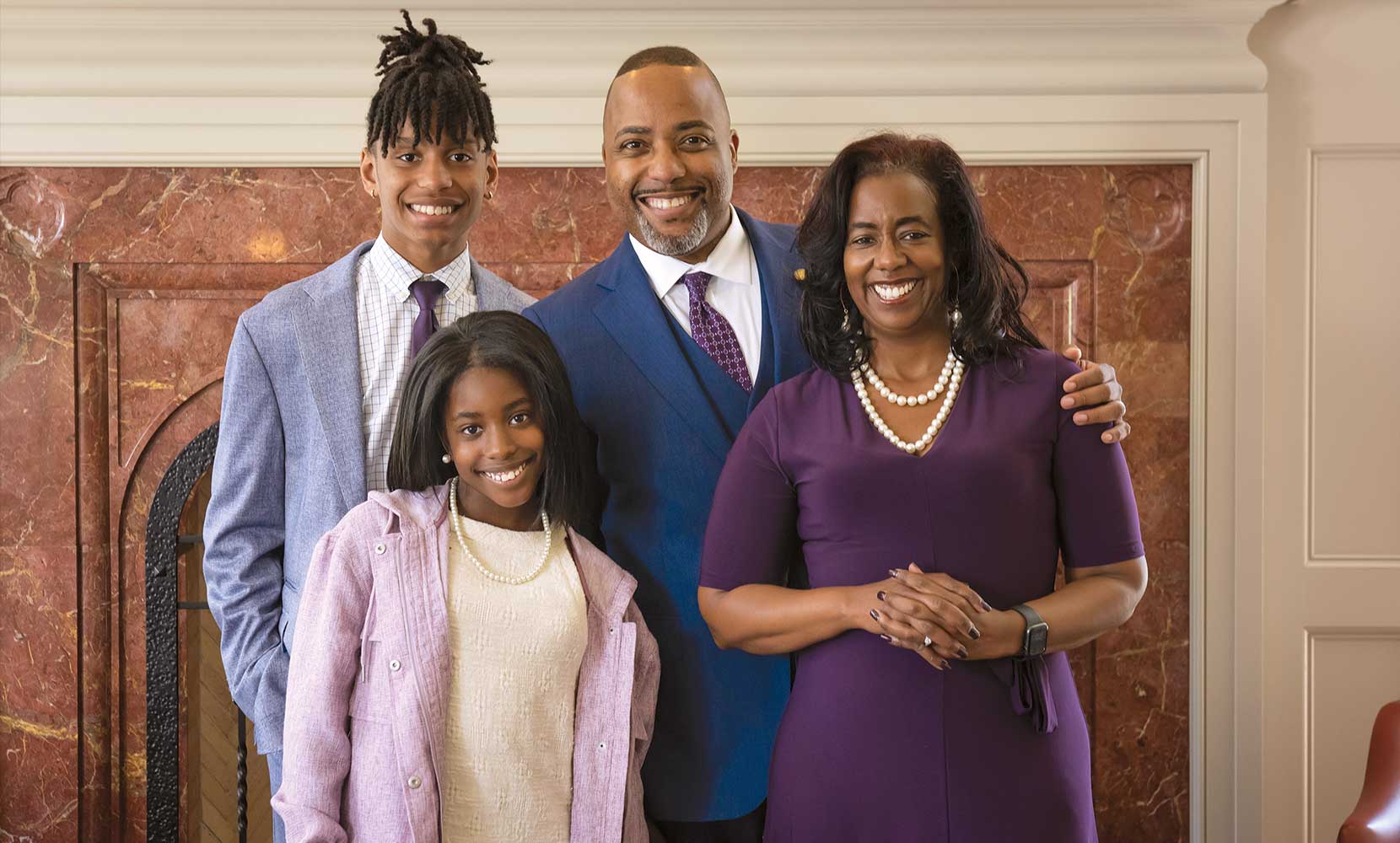
It’s impossible to talk about Rob Kelly and his career and where he belongs without mentioning his brilliant wife, Bridget Turner Kelly. They met at University of Maryland while they were both earning their PhDs. Rob left her love notes on her car window between classes. “I’d never met anyone like him,” Bridget told me. Her scholarship is in multiculturalism and diversity and equity in education, and she has researched and written extensively on mentorship and retention of Black faculty at predominantly white institutions. Two of her academic essays on student success and retention at historically Black universities have been cited in Amicus briefs in cases heading to the United States Supreme Court.
Rob finds her support and amplification of Black women to be inspiring. “She is a great teacher and a great researcher, one of those rare people who can do both well.”
They just celebrated their 20th anniversary. They married during their time at University of Vermont—Rob in student affairs and Bridget in a tenure-track professorship. She earned tenure while faculty at Seattle University and continued with tenured positions at Loyola University Chicago and the University of Maryland.
She also knows the college president life. Her father was one. During her younger years, her father was an associate dean of MIT’s graduate school. Her mother, a clinical social worker, saw student clients at Wellesley College. Bridget recalls her father holding retreats for Black MIT students in the ’70s and ’80s, finding ways to support them and encourage them. Her father eventually became the president of Knoxville College, a historically Black college, and she and her family lived on that campus. “They say you marry your father,” she said with a smile.
Their two beautiful children, Alex and Addison, are settling in well in Portland, and they’ll all soon have a presence on campus when they move into the president’s residence on The Bluff.
Through one lens, Rob Kelly’s education and career have taken him on a path that zigzags across the country. But viewed through another lens, his career is a straight and clear path to the presidency of a Catholic university.
Rob and Bridget are both deeply spiritual people, and Catholic social teaching and social justice are important components of this faith.
“He is rooted in Christianity,” said Fr. Sundborg, “and in his family and student development at the university.”
“Faith development in a college environment—it’s a place where I feel most at home, most whole,” Rob said. His own faith grew up in that environment, too.
In New Jersey, he went to Sacred Heart School until eighth grade, and he was an altar server at St. Peter’s Prep. When he decided to join the Catholic church, he says he felt he was coming home.
He is looking forward to leading a Holy Cross school. He believes that charism matters. Fr. Brian Linnane, SJ, the former president of Loyola University Maryland, noted Rob’s new partnership with the Congregation of Holy Cross, and, with confidence, said, “Rob will lead through the values they maintain.”
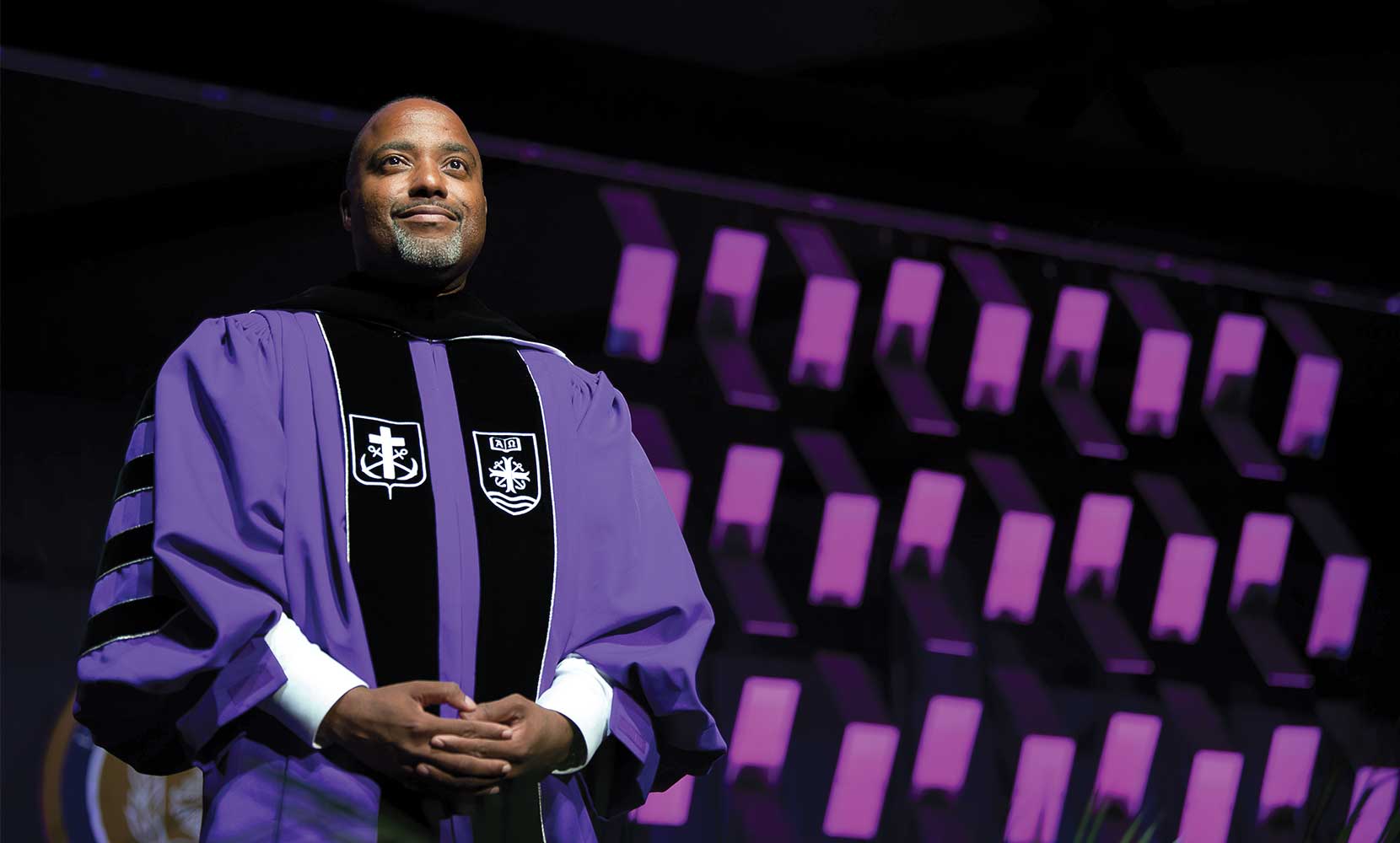
Rob has come to University of Portland at a challenging moment. When was the last time the institution—faculty, staff, and students— emerged from a global pandemic and all that it entailed?
Like so many of us, Rob had to dig deep into his faith during the pandemic experience. He admits that homeschooling was “not my strength.” And the period involved so many soul-searching challenges. “I remember people saying, ‘I just saw the murder of George Floyd. How are you doing?’” He said he felt despair. “I think it’ll be a while before we understand what that isolation did to all of us,” he said. He can see that healing still needs to happen.
There were bright spots. During the pandemic lockdown period, the Kellys made the best of things through rituals involving a regularly updated Spotify list and dance parties with the kids and Friday night takeout dinners (kids got to choose). He was grateful for the family time, and he was grateful that he had a home to go to.
Now that home is here in Portland.
When he arrived at UP for his interviews, he walked around The Bluff with Bridget on a tour that was supposed to be one hour and turned into several. He left thinking, “This is where I will serve. This is where I want to be.” In a recent roundtable discussion on Oregon Public Broadcasting, Rob was asked what he’d like to achieve at University of Portland. In addition to his hope that UP can be a “national leader in issues of diversity, equity, inclusion, and justice,” he said, “As University of Portland, I hope we’ll be able to say that we are anchored in Portland, engaged in Portland, [and] that we are the premier Catholic university of the West Coast, offering unparalleled experiences for students to be seen and heard in their entirety.”
In a later conversation, he mentioned he wished he’d changed “premier Catholic university” to “transformative Catholic university.” He thinks that’s more active and more all-encompassing. He wants to include students, faculty, and staff in that transformation. “Ideally,” he said, “it transforms everyone.”
JESSICA MURPHY MOO is the editor of Portland magazine.
University of Portland
5000 N. Willamette Blvd.,
Portland, Oregon 97203-5798
503.943.8000
This website uses cookies to track information for analytics purposes. You can view the full University of Portland privacy policy for more information.
